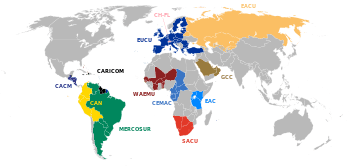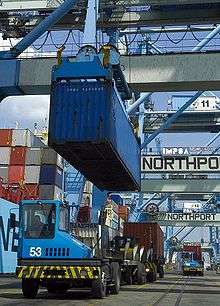Customs union
| Part of a series on |
| World trade |
|---|
 |
A customs union is a type of trade bloc which is composed of a free trade area with a common external tariff. The participant countries set up common external trade policy, but in some cases they use different import quotas. Common competition policy is also helpful to avoid competition deficiency.[1]
Purposes for establishing a customs union normally include increasing economic efficiency and establishing closer political and cultural ties between the member countries.
It is the third stage of economic integration.
Customs unions are established through trade pacts.
List of current customs unions (indicative)
| Agreement | Date (in force) | Recent reference |
|---|---|---|
| Andean Community (CAN) | 1988-5-25 | L/6737 |
| Caribbean Community (CARICOM) | 1991-1-1 | |
| Central American Common Market (CACM) | 2004-10-06 | WT/REG93/R/B/2 |
| East African Community (EAC) | 2005-1-1[2] | WT/COMTD/N/14 |
| Eurasian Customs Union (EACU) | 2010-07-1[3] | |
| European Union Customs Union (EUCU; EU–Monaco) | 1958 | |
| ∟ EU–Andorra Customs Union | 1991-7-1 | WT/REG53/M/3 |
| ∟ EU–San Marino Customs Union | 2002-4-1 | |
| ∟ EU–Turkey Customs Union | 1996-1-1 | WT/REG22/M/4 |
| Gulf Cooperation Council (GCC) | 2015-01-01[4][5][6] | |
| Israel–Palestinian Authority | 1994[7] | [8][9] |
| Southern Common Market (MERCOSUR) | 1991-11-29 | WT/COMTD/1/Add.17 |
| Southern African Customs Union (SACU) | 1910[10] | WT/REG231/3 |
| Switzerland–Liechtenstein | 1924 | |
| West African Economic and Monetary Union (WAEMU) | 1994-01-10 | WT/COMTD/N/11/Add.1 |
Note: Every Economic union, Customs and monetary union and Economic and monetary union includes a Customs Union.
Additionally the autonomous and dependent territories, such as some of the EU member state special territories, are sometimes treated as separate customs territory from their mainland state or have varying arrangements of formal or de facto customs union, common market and currency union (or combinations thereof) with the mainland and in regards to third countries through the trade pacts signed by the mainland state.[11]
Proposed
- 2010 Southern African Development Community (SADC)
- 2011 Economic Community of Central African States (ECCAS)
- 2015 Arab Customs Union (ACU)[12]
- 2019 African Economic Community (AEC)
- 2020 Australia–New Zealand (Closer Economic Relations)
Defunct
- Customs and Economic Union of Central Africa (UDEAC) – superseded by CEMAC
- 1925 French Customs Union over occupied Territory of the Saar Basin
- The former Zollverein
- Custom Union Between Lebanon and Syria[13]
Further reading
- The McGill University Faculty of Law runs a Regional Trade Agreements Database that contains the text of almost all preferential and regional trade agreements in the world. ptas.mcgill.ca
- Michael T. Florinsky. 1934. The Saar Struggle. New York: The Macmillan Company.
See also
- European Customs Information Portal (ECIP)
- List of international trade topics
- Trade creation
- Trade diversion
References
- ↑ Winters, Alan L (1991). International Economics, Volume IV. Routledge. pp. 528 pages.
- ↑ Signed 2000-7-7, but implemented in 2005.
- ↑ Customs Union of Eurasian Economic Community (EurAsEC) envisioned in its 1997-10-8 agreement, but not implemented. WT/REG71/8
- ↑ Agreed on 2003-1-1, WT/COMTD/N/25
- ↑ "GCC countries postpone customs union move".
- ↑ "GCC customs union fully operational". The Peninsula. 3 January 2015. Archived from the original on 1 February 2016. Retrieved 24 January 2016.
- ↑ Established following the Oslo Accords and the Paris protocol.
- ↑ Paris Protocol. B'Tselem, 19 September 2012
- ↑ Iqtisadi: The Israeli-Palestinian Economic Agreement and Current Consequences. Ephraim Lavie, Moshe Dayan Center–Tel Aviv University, January 2013
- ↑ latest revision is from 2004-7-15.
- ↑ EU Overseas countries and some other territories participate partially in the EU single market per part four of the Treaty Establishing the European Community; Some EU Outermost regions and other territories use the Euro of the currency union, others are part of the customs union; some participate in both unions and some in neither.
Territories of the United States, Australian External Territories and Realm of New Zealand territories share the currency and mostly also the market of their respective mainland state, but are generally not part of its customs territory. - ↑ "Gulf Daily News » Business News » Leaders set to approve Arab customs union". line feed character in
|title=at position 62 (help) - ↑ "Lebanon – FOREIGN RELATIONS".

